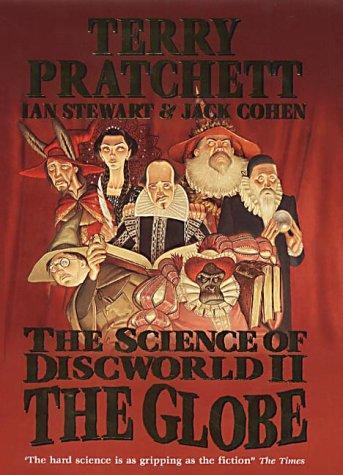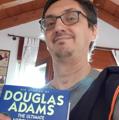Review of 'The Science of Discworld II' on 'Goodreads'
5 stars
Con qualche anno di ritardo, ho finalmente letto anche il secondo dei libri dello strano trio Pratchett / Cohen / Stewart, dedicato fondamentalmente a come si è sviluppata la specie umana non tanto come evoluzione - di quella se ne parlerà nel libro successivo - quanto come culture e usanze. Si va dalla definizione di cosa è il sé all'evoluzione, dall'extelligenza (la parte dell'intelligenza che viene trasmessa non con i geni ma mediante supporti esterni) al dualismo tra informazione e termodinamica. Il tutto presentando teorie e punti di vista che non si vedono mai nella scienza ufficialmente divulgata, come il passaggio dai primati all'uomo forse avvenuto perché un gruppo di scimmie si è trovata in un posto con molti pesci e molluschi che hanno loro dato le proteine necessarie per creare le membrane neuronali, oppure la constatazione che la gravità funziona diversamente dalla termodinamica e quindi non è necessariamente strano …
Con qualche anno di ritardo, ho finalmente letto anche il secondo dei libri dello strano trio Pratchett / Cohen / Stewart, dedicato fondamentalmente a come si è sviluppata la specie umana non tanto come evoluzione - di quella se ne parlerà nel libro successivo - quanto come culture e usanze. Si va dalla definizione di cosa è il sé all'evoluzione, dall'extelligenza (la parte dell'intelligenza che viene trasmessa non con i geni ma mediante supporti esterni) al dualismo tra informazione e termodinamica. Il tutto presentando teorie e punti di vista che non si vedono mai nella scienza ufficialmente divulgata, come il passaggio dai primati all'uomo forse avvenuto perché un gruppo di scimmie si è trovata in un posto con molti pesci e molluschi che hanno loro dato le proteine necessarie per creare le membrane neuronali, oppure la constatazione che la gravità funziona diversamente dalla termodinamica e quindi non è necessariamente strano che stelle e pianeti siano un sistema più "ordinato" di quello formato da un gas. Anche il loro modo di guardare alla religione e all'arte è sicuramente poco ortodosso: se non siete degli integralisti - ce ne sono anche nel campo artistico, sì - magari non sarete d'accordo con gli autori ma potrete comunque trovare ottimi spunti per pensare per conto vostro. Il che non è poco.

